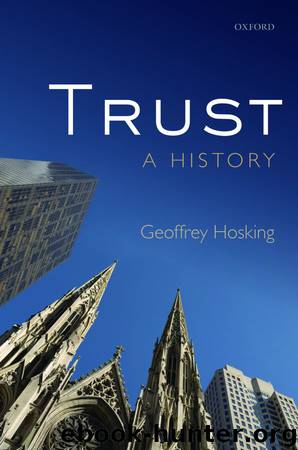Trust: A History by Geoffrey Hosking

Author:Geoffrey Hosking
Language: eng
Format: mobi
ISBN: 9780198712381
Publisher: Oxford University Press
Published: 2014-07-15T00:00:00+00:00
5
Promised Lands
Nations and Symbols of Trust
In a public lecture of 1882 at the Sorbonne the French thinker Ernest Renan asked the question ‘What is a nation?’, and he suggested several obvious answers, only to reject them all. Is it perhaps a race of people? he suggested. No, since modern nations have many racial origins: the French, for example, are Celtic, Iberian, and German. Is it the speakers of a common language? No, for otherwise the populations of Spain and much of South America would form one nation, while Switzerland would form several. Religion would also not qualify as a determining factor, since most nations contain several confessions; indeed religion had by the late nineteenth century become largely an individual or family matter in most European countries. Nor would shared economic interests or economic union explain nationhood: ‘A Zollverein is not a fatherland!’ Geographical features, such as rivers or mountain chains, sometimes form national boundaries, but more often they do not. We shall see later that all of these features have their significance, but Renan was right in asserting that none of them is conclusive.
His conclusion was that ‘A nation is a soul, a spiritual principle. Only two things, which are actually only one, constitute this soul, this spiritual principle. One is in the past, the other in the present. One is the common possession of a rich legacy of remembrances, the other is the present-day consent and wish to live together, the will to continue to value the common heritage.…A nation is a great community of solidarity constituted by the sense of the sacrifices which one has made in the past and which one is ready to make again. It presupposes a past, but all the same in the present it comes down to a palpable fact: the agreement and clearly expressed desire to continue the communal life.’ 1
Renan’s proposition is as apt and relevant today as it was in 1882, even though our economies and our communication systems are far more interlinked and globalized. Indeed, millions of people have in the meantime confirmed Renan’s assertions by displaying their readiness both to kill and to die for their nation. National wars have not only occurred frequently since the late nineteenth century; they have proved even more destructive than dynastic ones. That is because nations create both strong solidarities and also rigid boundaries. A major component of national feeling is the sense of the Other, the certainty about who one is not, whom one tends to distrust, or certainly trusts less readily. Here nations obey the same general tendencies which we have seen to operate in other contexts of trust and distrust: the stronger the feelings of mutual trust, the more rigid the boundaries around them. It is not clear in which direction the causal arrow points—probably both ways simultaneously—but in any event solidarity and boundaries are closely correlated. This helps to explain how the term ‘trust’ can be applied to an entity as large and complex as a nation. That trust is much easier to inspire among masses of people at a time of national danger or war.
Download
This site does not store any files on its server. We only index and link to content provided by other sites. Please contact the content providers to delete copyright contents if any and email us, we'll remove relevant links or contents immediately.
| Anthropology | Archaeology |
| Philosophy | Politics & Government |
| Social Sciences | Sociology |
| Women's Studies |
Nudge - Improving Decisions about Health, Wealth, and Happiness by Thaler Sunstein(7689)
The Fire Next Time by James Baldwin(5424)
iGen by Jean M. Twenge(5407)
Adulting by Kelly Williams Brown(4564)
The Sports Rules Book by Human Kinetics(4377)
The Hacking of the American Mind by Robert H. Lustig(4369)
The Ethical Slut by Janet W. Hardy(4240)
Captivate by Vanessa Van Edwards(3837)
Mummy Knew by Lisa James(3686)
In a Sunburned Country by Bill Bryson(3530)
The Worm at the Core by Sheldon Solomon(3483)
Ants Among Elephants by Sujatha Gidla(3459)
The 48 laws of power by Robert Greene & Joost Elffers(3229)
Suicide: A Study in Sociology by Emile Durkheim(3014)
The Slow Fix: Solve Problems, Work Smarter, and Live Better In a World Addicted to Speed by Carl Honore(3001)
The Tipping Point by Malcolm Gladwell(2908)
Humans of New York by Brandon Stanton(2864)
Handbook of Forensic Sociology and Psychology by Stephen J. Morewitz & Mark L. Goldstein(2692)
The Happy Hooker by Xaviera Hollander(2683)
